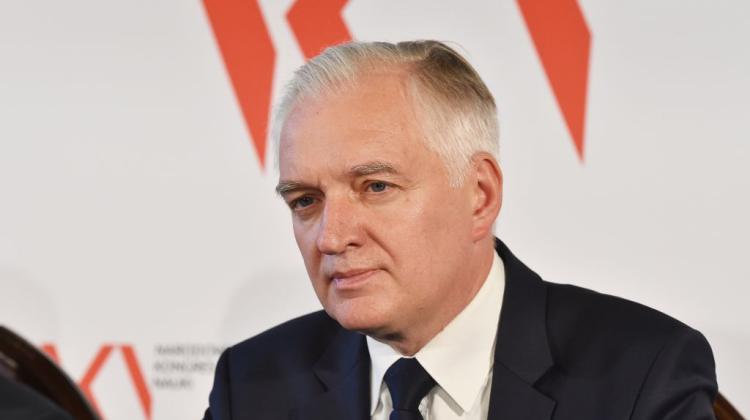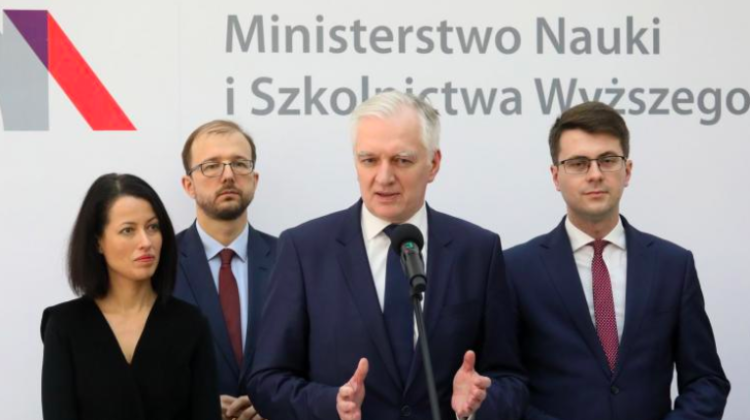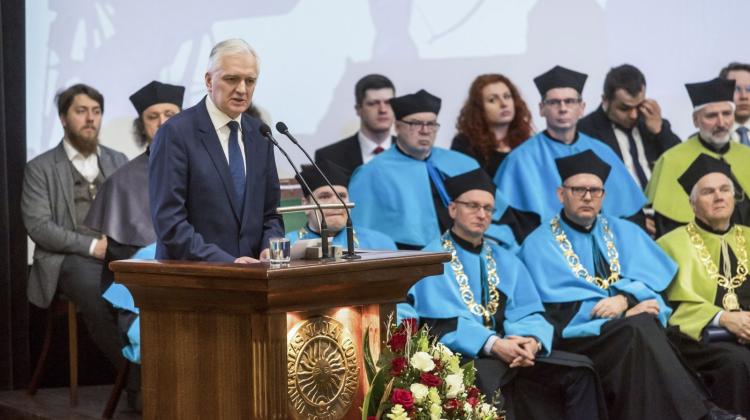Jarosław Gowin presented the assumptions of the new law on higher education
 Minister of Science and Higher Education Jarosław Gowin. Photo: PAP/Jacek Bednarczyk 19.09.2017.
Minister of Science and Higher Education Jarosław Gowin. Photo: PAP/Jacek Bednarczyk 19.09.2017.
Extension of university autonomy, division of universities into academic and professional ones, the possibility of organizing entrance exams, the new model of doctoral education - these are some of the assumptions of the law on higher education and science, presented on Tuesday by the Minister of Science Jarosław Gowin.
Extension of university autonomy, division of universities into academic and professional ones, the possibility of organizing entrance exams, the new model of doctoral education - these are some of the assumptions of the law on higher education and science, presented on Tuesday by the Minister of Science Jarosław Gowin.
Presentation of assumptions of the so-called Law 2.0, also known as the "Constitution for Science", is the main point of the National Congress of Science, which started on Tuesday in Kraków.
Deputy Prime Minister, Minister of Science and Higher Education Jarosław Gowin recalled during the speech that work and consultation on the "Constitution for Science" lasted 574 days.
He emphasized that this was "a different kind of reform". "This is an unprecedented event when it comes to lawmaking in Poland after 1989, an event that the European Commission calls an example for other countries to follow when preparing great systemic changes" - he noted.
He added that the reform of science and higher education was demanded, proposed in its main assumptions and discussed by the academic community itself. He noted that "the reform of science and Polish universities requires a close cooperation between the science community and politicians. It also requires mutual trust".
The two-day meeting is attended by nearly 3000 representatives of the academic community. During speeches, panels and seminars, at which specific legislative proposals will be analysed, participants can submit comments and proposals concerning provisions in specific sections of the bill.
Deputy Prime Minister noted that the new law on education will reduce the number of provisions by half, as it integrates the matter of three laws: the Law on Higher Education, the Law on the Financing of Science and the Law on Academic Degrees and Titles, and additionally the Law on Student loans. The number of regulations, of which there are currently 80, is also expected to be reduced by half.
Gowin said that the new law will extend the autonomy of universities. "Our universities must be autonomous, but that does not mean they should be isolated or detached from the environment" - he said
As he explained, the Law 2.0 increases the role of university statutes, which will regulate a large number of matters currently regulated in laws and executive acts.
He announced that universities will have one year from the entry of the law into force to prepare statutes. "But I would like to urge the rectors not to wait for the entry of the law into force and start reflecting on the shape of new statutes now" - minister said
He noted that "universities, and not their organizational units, will be assigned the right to run studies and award degrees. Universities, not faculties, will be the subject of evaluation in particular disciplines"
Gowin announced that the Law 2.0 will include two flagship programs to support the universities\' pursuit of scientific excellence: "Initiative of Excellence: Research University" and "Regional Initiatives of Excellence".
Deputy Prime Minister emphasised that the reform must go hand in hand with increased funding for science, spending on science and education must be much higher, because only then will Polish scientists be able to compete with very good foreign universities. He added that after the reform, universities will have much more flexibility with regard to spending the funds they receive
He noted that until now public universities could receive funds from dozens of different sources. "It was extremely complicated, very unclear, very problematic. Now a university will receive these funds from less than 10 sources - but this does not mean that budgetary resources are being diminished (...) Our goal is a more efficient management of financial flows within the universities. It is about allowing flexible spending of funds" - Gowin said.
He also called on the politicians in attendance to make a bipartisan agreement to increase spending on science and education. "This is Polish national interest" - Gowin emphasized.
According to the minister, one of the most important points of the new law is the introduction of a new model of doctoral education. He announced that the new law on higher education will introduce education in doctoral schools and changes in the scholarship system.
The new model will be based on two modes. "Education in doctoral schools that will replace the current, too narrow doctoral studies, and extramural education, which will be an improved version of the current extramural PhD. We discontinue part-time doctoral studies, their level of effectiveness is abnormally low. PhD schools are a well-known model in the world" - explained Gowin.
"A doctoral school can be established for at least two disciplines in which the university has the power to award doctorate degrees. Doctoral schools can also be created jointly by universities, institutes of the Polish Academy of Sciences or research institutes. We want to increase cooperation between universities, research institutes and institutes of the Polish Academy of Sciences" - declared Minister Gowin. He emphasized that if Poland wants to have an innovative economy, a modern state, scientists need to be present in all areas of key activities.
The second change in the doctoral students\' education will be a universal scholarship system.
"PhD students can not be on a verge of starvation. The minimum scholarship will be 110 percent minimum wage for the first two years, and after the mid-term evaluation it will increase to a minimum of 170 percent. Our estimates show that this will be one of the most expensive elements of reform, but it is really necessary. I am certain that this change absolutely necessary, (...) educating future elites is in our national interest. We also plan to introduce the evaluation of doctoral schools with the participation of international experts, and a number of other solutions to improve the quality of doctoral projects" - declared the Deputy Prime Minister.
The minister also mentioned the problems of universities, such as irrational approach to shaping the educational offer, "bizarre" courses detached from the real needs of students and the labour market, bureaucratic deficiencies (especially staffing regulations), the ineffectiveness of the system in eliminating the low quality of studies.
"In the previous term, only 2% of the Polish Accreditation Committee ratings were negative, and that means that those ratings were essentially useless" - Gowin noted.
Gowin considers doing away with staff minima an important change in the mode of conducting studies. "Staff minima were once an instrument to protect against pathologies. Today, in conditions of demographic low, staff minima are becoming a ballast" - he said.
Instead of minima, the ministry wants at least 50% hours at practical courses to be taught by academics employed at the university as a primary place of work. For studies with a general profile, this threshold has been set at 75 percent.
In Gowin\'s opinion as a result of abolishing staff minima, the role of the Polish Accreditation Committee assessment will be strengthened.
The Ministry of Science and Higher Education is also planning a comprehensive review that will "verify the extent to which the university itself is able to ensure quality education" - Gowin said. Working out criteria and procedures based on international standards that take into account specific Polish conditions will take place within two years.
The new law will also meet the demands of the parliament of students - there will be a departure from agreements between students and universities. Other tools for protecting students\' rights will appear in their place - for example, a list of fixed fees charged to students.
The quality of education is expected to improve as a result of new solutions, such as extending the duration of extramural studies. According to Gowin, extramural studies should provide the same amount of knowledge and skills as full time studies.
The Minister of Science pointed out that the new law on universities abolished the habilitation obligation.
"Habilitation will be - as it is now - a pass to promote new doctors and to review doctoral dissertations. (...) At the same time, we are abolishing the obligation of habilitation, as well as the link between habilitation and various staff minima (...) or other powers which people with habilitation hold today" - said Deputy Prime Minister.
Jarosław Gowin argued that Poland had to "accept the fact that tens of thousands of young, often very talented Polish scientists emigrated after Poland\'s accession to the European Union to work at the world\'s best universities (...) and they are full professors there". He added that after returning to Poland they would be associate professors again. To make it easier for outstanding young academics to return to Poland, the new law will introduce a "quick path" to obtain a habilitation, as Gowin put it, "automatically in a sense" for winners of ERC grants other prestigious grants.
He reassured that the traditional path of obtaining a habilitation would be preserved "with modifications intended to increase its quality".
According to the Deputy Prime Minister, the reform will change the system of evaluation of scientific units. The powers to award degrees in a discipline will depend on the quality of scientific research expressed in the scientific category.
He explained that the starting point for the evaluation will be the introduction of a new classification of disciplines. In the centrally regulated classification there are 8 areas and 22 fields, with as many as 102 distinguished disciplines. "It does not really serve the quality of scientific research" - he said. "I decided that the optimal solution would be to transfer the OECD classification into the Polish reality" - said Gowin, although, as he added, it could not be transferred without alterations.
He pointed out that the Polish system of evaluating scientific units today is "a bureaucratic exercise that too seldom supports true scientific excellence".
At present, for example, even the units with the lowest scientific category C have the power to award habilitation. "I want to end this situation" - stressed Minister Gowin.
As he announced, the role of categorization of scientific units will increase significantly. There will be five, not four scientific categories: A+, A, B, C and a new B+. "The power to award doctoral degree will start at B+ category" - he said. Categories A and A+ will give the power to confer habilitation.
Minister announced that the program of raising publishing standards and scientific standards of Polish journals will be supported; the importance of monographs will increase; it is also planned to prepare a list of scientific publishers. "An important criterion in the new evaluation will be social impact, where the expert evaluation will play a key role" - he said.
After the changes, universities or institutes will be evaluated within the disciplines in which they conduct research. As a result - he said - historians will be compared with historians, and linguists with linguists.
Gowin announced that his ministry would like to give universities the opportunity to introduce entrance exams; the results of the high school exit exams would also have to be taken into account in the recruitment process. The results of high school exit exams will constitute not less than 50% points.
Gowin also assured that the Bologna system will be preserved. However, he added, after the group of research universities is selected, universities in this group "will have the freedom in determining the system of study".
Prof. Georg Winckler, the chairman of the panel of experts from the European Commission, who - at the request of Gowin- prepared a report on the Polish higher education system, also spoke at the congress. In his speech Winckler spoke about the problems Poland faces with regard to science and higher education. He drew attention to low R&D spending. "You have to increase funding" - he said. He also mentioned the problems with the mobility of Polish scientists and the insufficient internationalisation of our science. In his opinion, young researchers should have greater opportunity to conduct independent research.
Chairman of the Council of the National Congress of Science Prof. Jarosław Górniak recalled the process that the academic community and the Ministry of Science went through to create the new law. He emphasized that the reform was awaited by the academic community. "There is a conviction that science is diverse, measures of achievement and solutions must also be diversified, but each time they have to lead us to one goal - to quality" - he said.
The National Congress of Science is the beginning of a more than two-month consultation of the "Constitution for Science" project. The Ministry Of Science wants the new Law on higher education to become effective on 1 October 2018. Jaroslaw Gowin has already declared that he hopes the government to adopt the law in late 2017/early 2018 and forward it to the parliament. On Tuesday in Krakow he said that the public hearing of Law 2.0 may take place in January 2018.
Beata Kołodziej (PAP)
bko/ szz/ lt/ ekr/ akn/ kflo/ zan/ agt/ kap/
tr. RL
Przed dodaniem komentarza prosimy o zapoznanie z Regulaminem forum serwisu Nauka w Polsce.


















